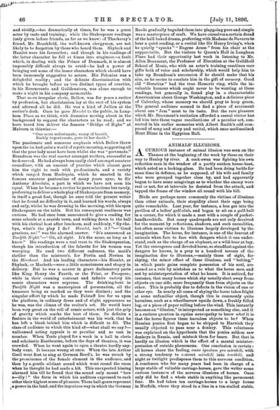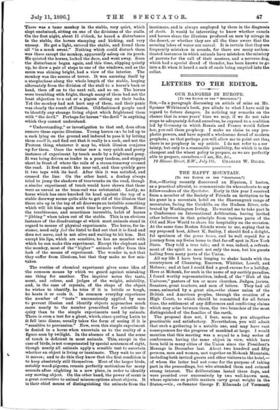ANIMALS' ILLUSIONS.
ACURIOUS instance of animal illusion was seen on the- Thames at the beginning of the week by those on their way to Henley by river. A cock-swan was fighting his own reflection seen in the window of a partly sunken house-boat, which acted as a looking-glass. He had been doing battle for- some time in defence, as he supposed, of his wife and family who were grouped together close by, and had apparently begun to have some misgivings as to whether the enemy were real or not, for at intervals he desisted from the attack, and tapped the frame of the window all round with his bill.
Birds are perhaps more commonly the victims of illusions
than other animals, their stupidity about their eggs being quite remarkable. Last year, for instance, a hen got into the pavilion of a ladies' golf-club, and began to sit on a golf-ball. in a corner, for which it made a nest with a couple of pocket- handkerchiefs. But many quadrupeds are not only deceived for the moment by reflections, shadows, and such unrealities, but often seem victims to illusions largely developed by the imagination. The horse, for instance, is one of the bravest of animals when face to face with dangers which it can under- stand, such as the charge of an elephant, or a wild-boar at bay. Yet the courageous and devoted horse, so steadfast against the- dangers he knows, is a prey to a hundred terrors of the- imagination due to illusions,—mainly those of sight, for- shying, the minor effect of these illusions, and "bolting," in which panic gains complete possession of his soul, are caused as a rule by mistakes as to what the horse sees, and not by misinterpretation of what he hears. It is noticed, for instance, that many horses which shy usually start away from objects on one side, more frequently than from objects on the other. This is probably due to defects in the vision of one or- other eye. In nearly all eases of shying the horse takes fright at some unfamiliar object, though this is commonly quite harmless, such as a wheelbarrow upside down, a freshly felled log, or a piece of paper rolling before the wind. This instantly becomes an "illusion," is interpreted as something else, and it is a curious question in equine nenropathy to know what it ie that the horse figures these harmless objects to be ? When Russian ponies first began to be shipped to Harwich they- usually objected to pass near a donkey. This reluctance was explained on the hypothesis that the ponies seldom saw donkeys in Russia, and mistook them for bears. But that is- hardly an illusion which is the effect of a mental misinter- pretation of outside phenomena. One conclusion is certain : all horses share the feeling, omne ignotu2n pro mirabili, with a strong tendency to cAavert mirabili into terribili, and/ night or twilight predisposes them to this nervous condition. A coachman who for many years had been in charge of a large stable of valuable carriage-horses, gave the writer some curious instanc?s of the nervous illusions of horses. Once only did he find a whole stable in anything like permanent. fear. He had taken ten carriage-horses to a large house in Norfolk, where they stood in a line in a ten-stalled stable.
There was a tame monkey in the stable, very quiet, which slept unchained, sitting on one of the divisions of the stalls. On the first night, about 11 o'clock, he heard a disturbance in the stable, the horses stamping and kicking, and very uneasy. He got a light, entered the stable, and found them .311 "in a muck sweat." Nothing which could disturb them was there except the monkey, apparently asleep on its perch. He quieted the horses, locked the door, and went away. Soon the disturbance began again, and this time, slipping quietly up, he drew a pair of steps to one of the windows, and as the moon was shining bright, had a view of the interior. The monkey was the source of terror. It was amusing itself by a steeplechase along the whole length of the stable, leaping alternately from the division of the stall to a horse's back or head, then off on to the next rail, and so on. The horses were trembling with fright, though many of them had not the least objection to a cat or a pigeon sitting on their backs. Yet the monkey had not hurt any of them, and their panic was clearly the result of illusion. Old-fashioned people used to identify any strange living object which frightened them with "the devil." Perhaps for horses "the devil" is anything which they cannot understand.
"Understanding," or investigation to that end, does often remove these equine illusions. Young horses caa be led up to a sack lying on the ground and induced to pass it by letting them smell it, and find out that it really is a sack, and not the Protean thing, whatever it may be, which illusion conjures 'up for them. Once the writer saw a very quick and pretty instance of experiment by touch made by a frightened pony. It was being driven as leader in a pony tandem, and stopped short in front of where the rails of a steam-tramway crossed the road. It first smelt the near rail, and then quickly gave it two taps with its hoof. After this it was satisfied, and .crossed the line. On the other hand, a donkey always tried to jump the shadows of tree-trunks on the road, though a similar experiment of touch would have shown that these were as unreal as the tram-rail was substantial. Lastly, no 'horse which has once knocked its head against the top of a stable doorway seems quite able to get rid of the illusion that there sits up in the top of all doorways an invisible something which will hit him again next time he goes through. Hence the troublesome, and sometimes incurable, habit of horses -" jibbing" when taken out of the stable. This is an obvious instance of the disadvantage at which most animals stand in regard to means of physical experiments. The horse, for in- stance, need only feel the lintel to find out that it is fixed and -does not move, and is not alive and waiting to hit him. But -except his lips, which are sensitive, he has no member with which he can make this experiment. Except the elephant and the monkey, most of the "higher" animals suffer from this lack of the means of experiment. The wonder is, not that they suffer from illusions, but that they make so few mis- takes.
The routine of chemical experiment gives some idea of the common means by which we guard against mistaking one thing for another. The inquirer notes the taste, scent, and colour, and judges of the weight, solubility, and, in the case of crystals, of the shape of the object he wishes to identify, he tries if it is brittle or tough, ,he heats it or cools it. In common everyday experience the number of " tests " unconsciously applied by men to prevent illusion and identify objects approaches much snore nearly to the number prescribed for scientific in- quiry than to the simple experiments used by animals. There is even a test for a ghost, which, since quoting Latin to it fell into disuse, usually takes the form of seeing if it is -4' sensitive to percussion." Now, even this simple experiment is denied to a horse when uncertain as to the reality of a figure seen by twilight. In the absence of a hand the sense of touch is deficient in most animals. This, except in the -case of birds, is not compensated by special acuteness of sight, though nearly all animals apply a sensible test to ascertain whether an object is living or inanimate. They wait to see if it moves; and to do this they know that the first condition is to keep absolutely still themselves. Most of the larger birds, 'notably wood-pigeons, remain perfectly motionless for many seconds after alighting in a new place, in order to identify any moving object. On the other hand, the power of scent is a great corrective to animal misconceptions about objects. It is their chief means of distinguishing the animate from the
inanimate, and is always employed by them in the diagnosis of death. It would be interesting to know whether camels and horses share the illusions produced on men by mirage in the desert, or whether they are all the time aware that the seeming lakes of water are unreal. It is certain that they are frequently mistaken in sounds, for there are many authen- ticated instances in which animals have mistaken the mimicry of parrots for the call of their masters, and a nervous dog, which had a special dread of thunder, has been known to go into a fit when it heard a sack of coals being emptied into the cellar.



































 Previous page
Previous page